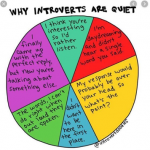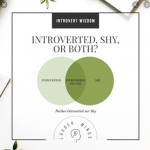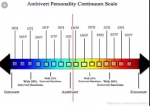What if I told you that the introvert I was describing was me? Would you still call it damaging? Wouldn’t you agree that some introverts are introverted because of fear? You see, maybe I am what you guys would describe as a shy extrovert, but my introverted-ness is based in being self-conscious. That is fear.
Maybe my brush was swiped too broadly to encompass all introverts but surely it describes some? I know I have at times felt hindered by fear, and as a result acted in an introverted way.
I can see this topic is very personal to you and I’m sorry if my post sparked something in you, that wasn’t pleasant. I don’t mean to make you or anyone feel like an alien or living as a mistake, and my intent was only to encourage any introvert that is introverted as a result of fear. They exist.
Maybe I am misinformed on this topic, but I can only describe to you my experience with extroversion and introversion on a personal level.
I guess some people see the glass as half full, while others see it as half empty...
I on the other hand strive to understand the science that helps us to better understand the available data and how best to possibly assess the data to ensure an 'informed' understanding of the basis for our respective perspectives...
The scientific difference is explained as differences in reward systems - that are essentially in-grained preferences that are wired within the respective nervous systems that they were born into...
That being said, I guess fear could be a mis-placed interpretation, understanding or perception of those who are afraid to try to do or be something that they are not intended to be; or the flawed perception that those who are unable to be more like me - simply must be afraid - to try to be more like me...
Why Introverts and Extroverts Are Different: The Science
“The dopamine difference
One major difference between the brains of introverts and extroverts is the way we respond to the neurotransmitter
dopamine. Dopamine is a chemical released in the brain that provides the motivation to seek external rewards like earning money, climbing the social ladder, attracting a mate, or getting selected for a high-profile project at work. When dopamine floods the brain, both introverts and extroverts become more talkative, alert to their surroundings, and motivated to take risks and explore the environment.
It’s not that introverts have less dopamine present in their brains than extroverts do. In fact, both introverts and extroverts have the same amount of dopamine available. The difference is in the activity of the dopamine reward network. It is more active in the brains of extroverts than in the brains of introverts…”
“For introverts, acetylcholine is where it’s at
Introverts prefer to use a different neurotransmitter called
acetylcholine… Like dopamine, acetylcholine is also linked to pleasure; the difference is, acetylcholine makes us feel good when we turn inward. It powers our abilities to think deeply, reflect, and focus intensely on just one thing for a long period of time. It also helps explain why introverts like calm environments—it’s easier to turn inward when we’re not attending to external stimulation.
Nervous system differences
Another piece of the introvert-extrovert puzzle has to do with the nervous system... Acetylcholine is linked to the parasympathetic side of the nervous system, which is nicknamed the “throttle down” or “rest-and-digest” side. When we engage the parasympathetic side, our body conserves energy, and we withdraw from the outer environment. Our muscles relax; energy is stored; food is metabolized; pupils constrict to limit incoming light; and our heart rate and blood pressure lower. Basically, our body gets ready for hibernation and contemplation—two of the things introverts like the most.”
1
1





